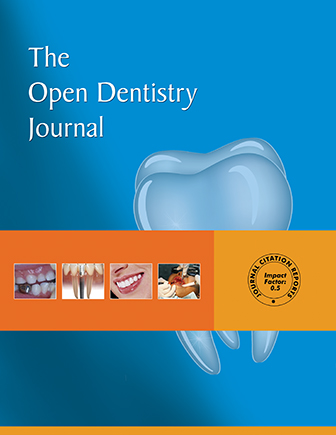All published articles of this journal are available on ScienceDirect.
A University-based Survey of Career Choices and Perspectives on Higher Education among Dental Students in United Arab Emirates.
Abstract
Background:
Over the past decade, higher education has made significant progress in the Gulf Corporation Council Region (GCC) due to the promotion and investments made by the local governments. Medical and dental higher education has undergone massive transformation across all the universities in the United Arab Emirates (UAE) due to the implementation of innovative educational policies.
Objectives:
The objective of the survey was to determine the career choices and assess the perspectives on higher education among dental students of a medical university in the UAE.
Methodology:
Structured closed-ended survey questionnaire was provided to 377 respondents at a dental school of a private medical university in UAE.
Results:
The results of the survey revealed that 51% of the respondents wanted to pursue specialization in dentistry. Orthodontics (33%), endodontics (28%) and oral surgery (16%) were the most preferred branches for specialization. UAE was the most preferred destination for pursuing specialization. Quality of education and proximity to the family were the most common reasons for selecting UAE as the destination for specialization. 36% of the survey respondents wanted more dental post-graduate seats to be available in the UAE. 57% of the survey respondents felt that the cost of post-graduation is comparable to other countries. 64% of the survey respondents felt that Doctor of Philosophy(PhD) program should be offered by medical universities in the UAE.
Conclusion:
To conclude it can be stated that dental undergraduate students in the UAE prefer to pursue specialization in clinical branches like orthodontics, endodontics and oral surgery. Majority of the respondents prefer to pursue their specialization in the UAE due to the quality of education. Survey respondents felt that there was a need to offer more dental post-graduation and dental PhD programs by UAE universities.
1. INTRODUCTION
Dental education has evolved rapidly in the Middle East in general and GCC in specific over the past decade [1-4]. United Arab Emirates and Saudi Arabia have made considerable progress in both the quantity and quality of dental schools in the past few years [1-3]. Students from different parts of the world study dentistry in the United Arab Emirates [1]. It is an astounding fact that a country which had no dental college till 1997, today has 7 dental schools, with 4 of them providing post-graduate courses [1]. Apart from Emiratis, students from other GCC nations, Arab nations(Egypt, Iraq, Syria, Jordan, Palestine) Asian countries(India, Pakistan, Sri Lanka), African countries (Nigeria, South, Africa) and Iran study at the dental schools [1]. The dental schools in UAE also have a significant number of Arabic-origin students with American, Canadian and European citizenship. The College of Dentistry (COD), Gulf Medical University (GMU) located in Ajman, United Arab Emirates, has a diverse group of students from different nationalities. The aim of our study was to assess the career intentions of dental students in Gulf medical university. This would provide us with an overview of the changing scenario, current trends and future avenues of dental education in the GCC region.
2. MATERIALS AND METHODS
A cross-sectional study (questionnaire-based) was conducted to determine the career intentions of 377 dental students and interns in the United Arab Emirates. The study was conducted at COD, GMU located in the emirate of Ajman. The COD, GMU offers credit-bearing undergraduate dental program titled DMD (Doctor of Dental Medicine). The duration of the program is 5 years (10 semesters) followed by 1 year of internship. The study population included all undergraduate dental students and interns of the COD. Postgraduate dental students of the COD were not included in the study. The questionnaire used for the study had close-ended questions, which were validated on a sample of 20 students before being administered the study cohort(Table 1).
A standard written consent form with adequate written information about the purpose, procedure and advantages of the study was provided to each participant. Prior to the commencement of the study, ethical approval was obtained from the Institutional Review Board of GMU (Ref. no. INT/COD/FR/004-2020). The descriptive statistics like numbers, percentages were calculated and displayed as graphs
3. RESULTS
The survey forms were distributed among 391 students, amongst which 377 completed the survey. Among them, 42 respondents were interns, rest of them were dental students from fifth to the first year (Fig. 1). The highest number of survey respondents were from the first year (n=77) and the least from internship (n=42).
Among the 377 study respondents, 213 (60%) were females and 144 (40%) were males (Fig. 2). The number of female respondents was more than the male respondents at all the levels of study except the internship were the distribution was vice versa (Fig. 3).
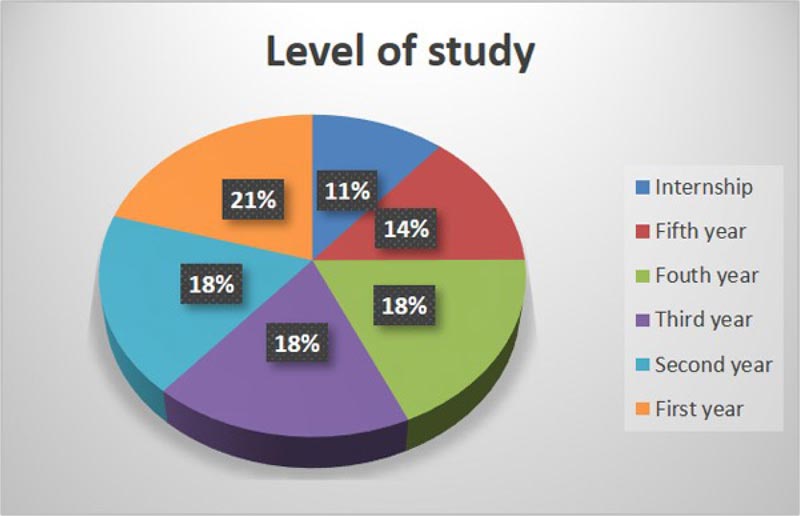
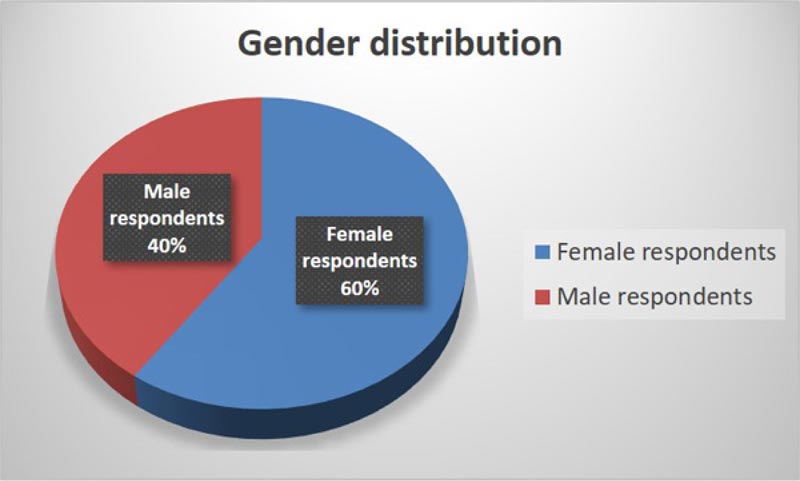
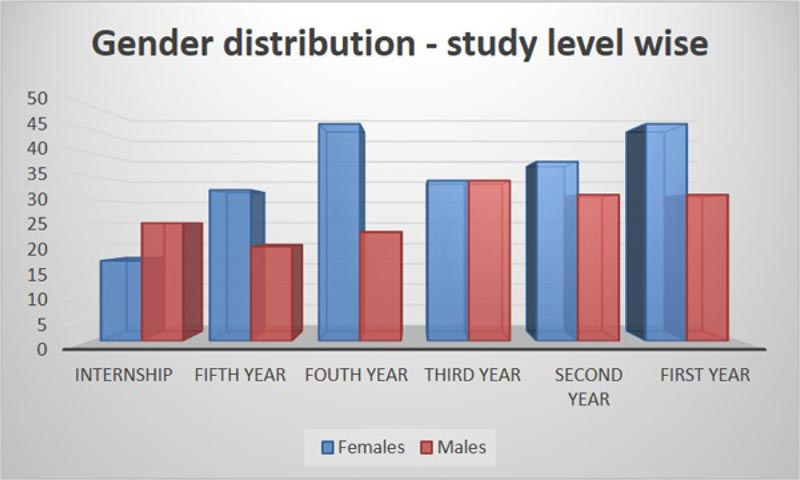
When the ethnicity of the students was evaluated, the majority of the students were from the Arab nations (Syria, Iraq, Egypt, Jordan, Palestine) (n=137), followed by South Asians (India, Pakistan, Bangladesh, Afghanistan, Sri-Lanka) (n=88), GCC nations (United Arab Emirates, Saudi Arabia, Bahrain, Oman, Qatar) (n=80), Iran (39), Europe and North America (24) and African nations (n=9) (Fig. 2). All the levels of the study showed a similar pattern of ethic distribution of study respondents (Figs. 4 and 5).
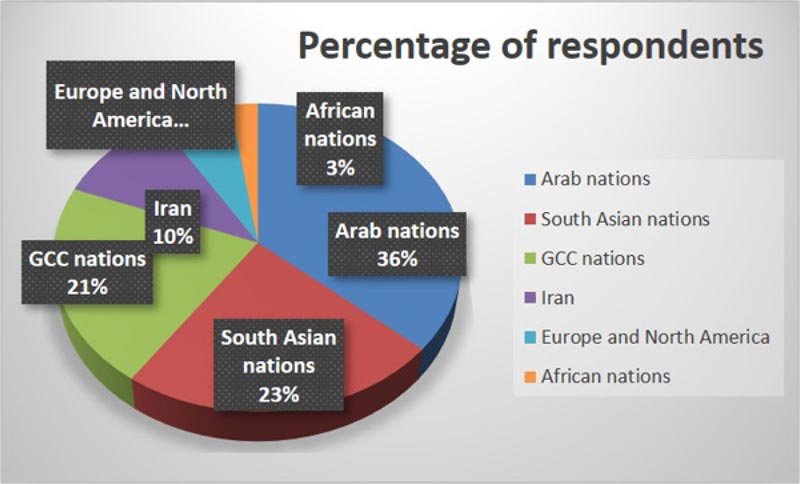
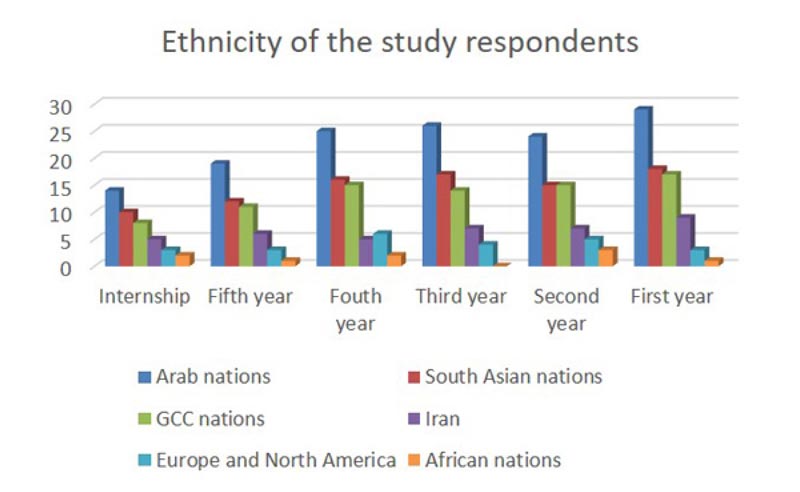
When enquired about the career option, the majority of the respondents opted for specialization (n=190), followed by private clinics (n=84), government sector (n=65) and research (n=9). Few respondents were not sure of their future educational pathways (n=18), few others were contemplating a change in their career (n=11) (Fig. 6).
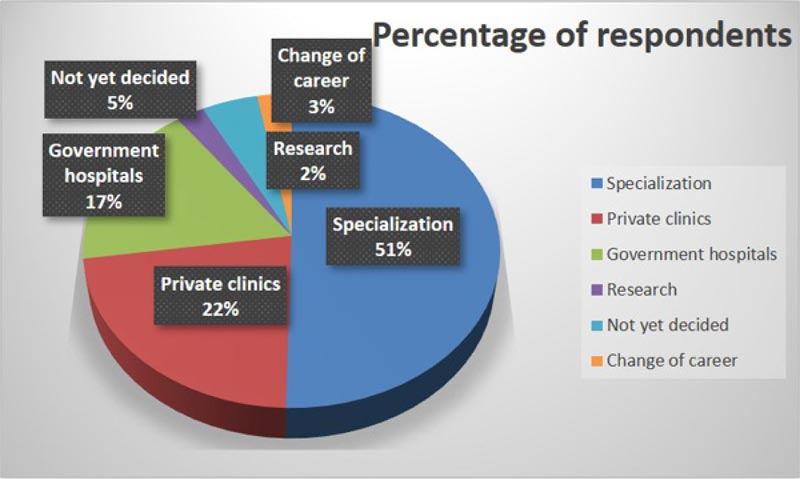
All the levels of the study showed a similar pattern of career choice of study respondents. However, it has to be noted that 6 respondents in the first year were not sure about their career choice (Fig. 7).
When enquired about the choice of specialization orthodontics (n=62) was the preferred branch followed by endodontics (n=53), oral surgery (n=30), prosthodontics (n=21), periodontics (n=12), pedodontics (n=9) and others (oral medicine, oral radiology, community dentistry) (n=3) (Fig. 8).

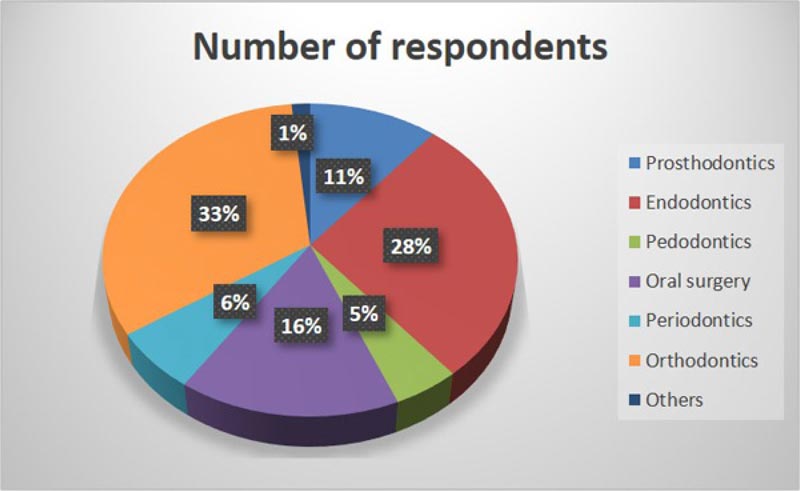
All the levels of the study showed the similar specialization choice of study respondents. Orthodontics was the preferred choice in all the years except 3rd year. Endodontics was the most preferred choice of specialization among the 3rd year respondents (Fig. 9).
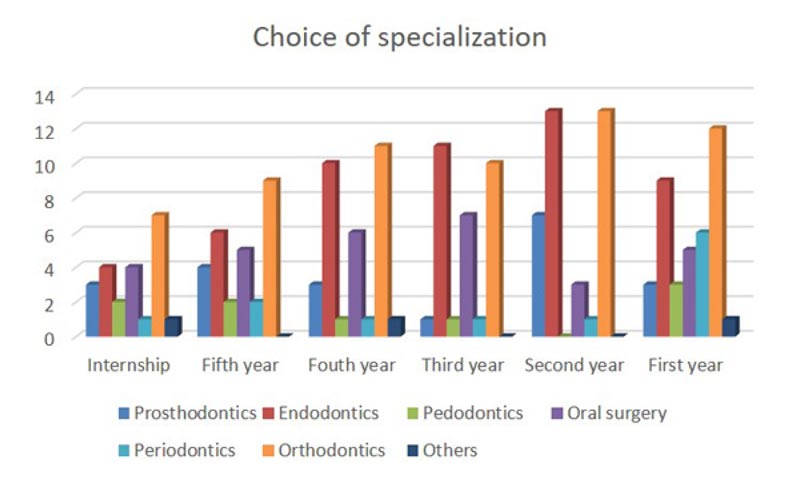
When asked about the preferred place for pursuing post-graduation in dentistry. Most of the respondents preferred UAE (n=125) followed by Europe (n=44), North America (n=13) and other countries (n=8) (Fig. 10).
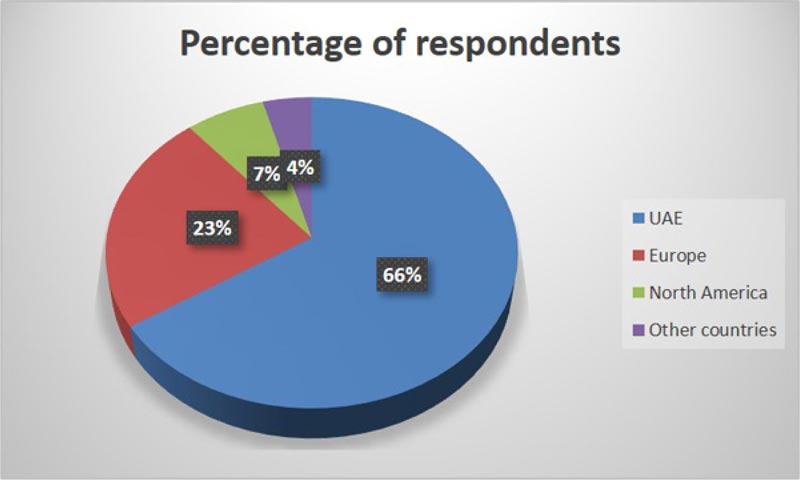
The majority of respondents from all the levels of the study showed interest in pursuing their specialization in the UAE. Europe and North America were other preferred choices (Fig. 11)
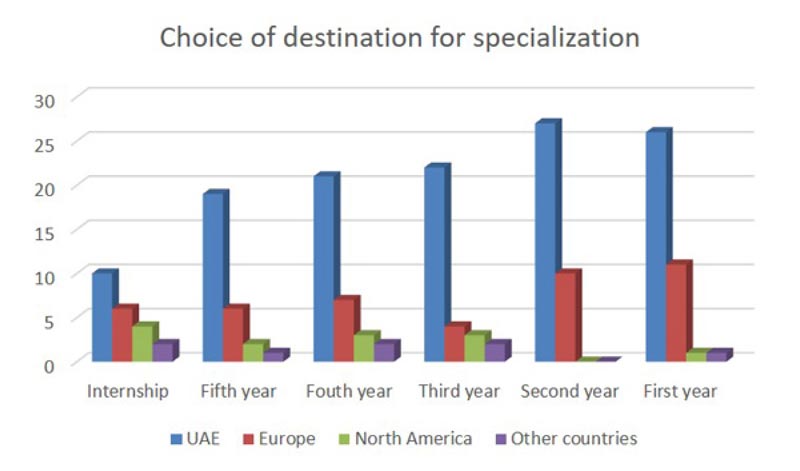
When the students (n=125) who had selected UAE as the preferred destination for higher education were asked the reason for their decision, the majority of the students stated quality of education (n=53) and proximity to the family (n=50) as the main reasons. Some respondents also stated that the financial factors (n=16) influenced the choice of destination for specialization (Fig. 12).
When the students who had selected UAE as the preferred destination for dental higher education were asked whether there is an adequate number of seats available for dental post-graduation in the UAE, 65 of the respondents felt there were enough post graduate seats. However, 45 respondents felt that the current number of seats in post-graduation was not enough and more seats need to be added. The remaining 15 respondents were not sure about the adequacy of post-graduate seats (Fig. 13).
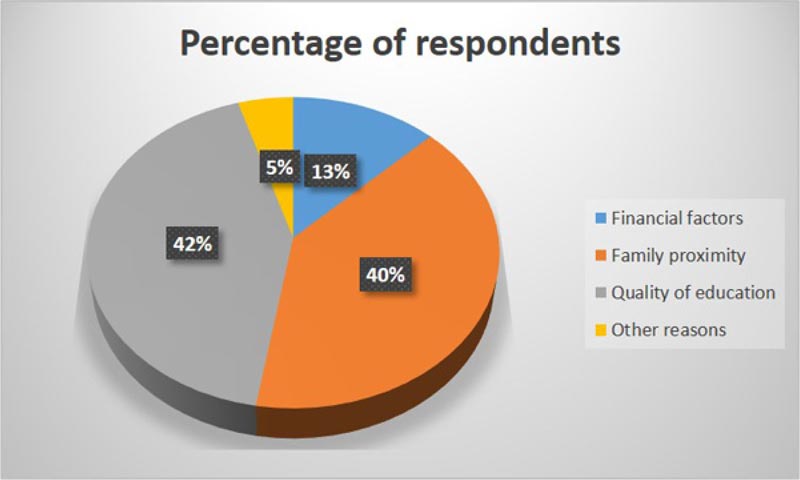
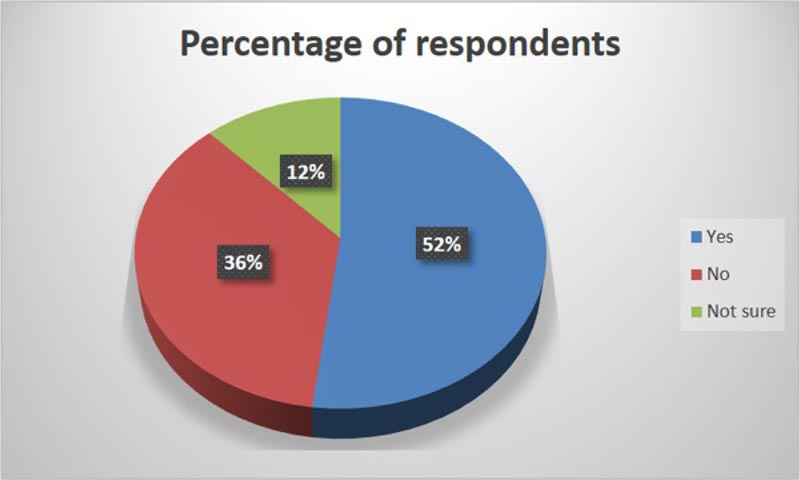
When the students who had selected UAE as the preferred destination for dental higher education were asked the cost of dental post-graduation in UAE, 71 survey respondents felt that it was comparable to other countries, 19 respondents felt that the cost was higher than the other countries, 10 respondents felt it was lower than other countries, whereas 25 respondents were not sure of the cost of the dental post-graduation seats in the UAE (Fig. 14).
When the students who had selected UAE as the preferred destination for dental higher education were asked whether universities in UAE should look towards offering PhD (Doctor of Philosophy) programs in dentistry, 116 respondents answered in affirmative, 3 stated “No”, whereas 6 respondents were not sure of the PhD programs (Fig. 15).
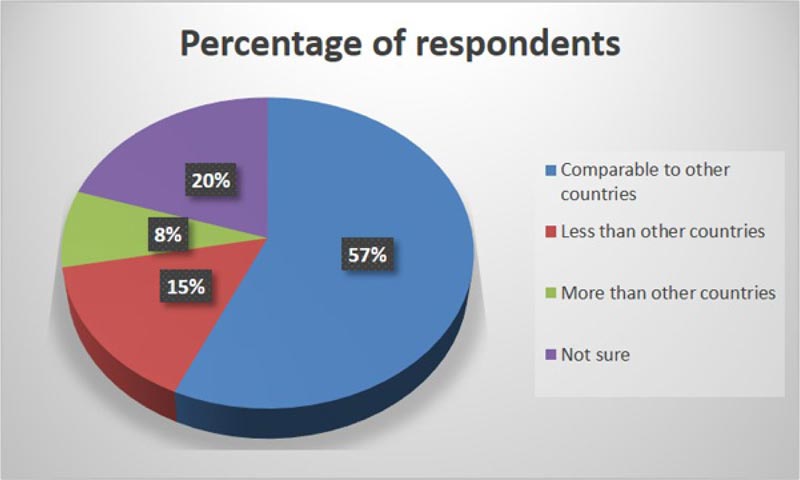
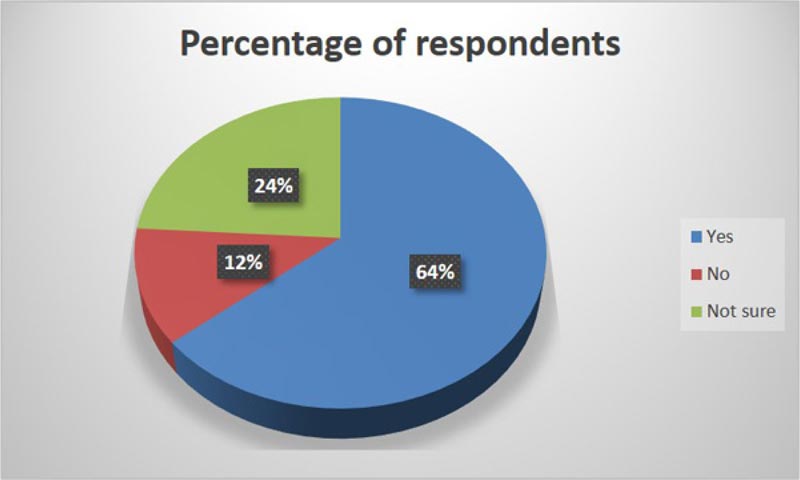
4. DISCUSSION
A total of 377 dental students across different levels (years) of the study and internship responded to our career choice survey. We found that there was only one similar survey conducted in the same region, but it was conducted on a smaller sample size(n=71). It is important to note that the previous survey involved only final year dental students. The probable reason for including only final year students in the previous survey could be due to the fact that at a higher level/year of students are in a better situation to decide on their career choice.
It is important to note that there were some dropouts in our survey. In the study by Rashid et al., 16 subjects did not respond to the study questionnaire, whereas 14 subjects did not respond to the questionnaire in the present study [1].
In the present study, majority of the study subjects were females. Similar gender distribution was reported by few recent career surveys in the GCC region, especially in Saudi Arabia [1, 5]. However, some studies conducted in the same also reported a higher number of male respondents than females [6, 7]. Most of the recent surveys conducted in different parts of the world show a greater number of female students compared to male students in dental schools [8, 9]. The probable reason for more females opting for dentistry is because there are no night shifts unlike the medical field. Dentistry also is suited for flexible appointment schedules and career breaks, which gives an opportunity for women to spend family time [10].
In the present study, when the ethnicity of the students was evaluated, it was found that most of the students were from the Arab nations, followed by GCC nationals and South Asians. Similar pattern was observed in the study conducted by Rashid HH et al., however, the percentage of South Asian nationals was considerably higher in our study [1, 11]. South Asians form a significant majority of the UAE ex-pat population, therefore a considerable size of the student population in the country is of South Asian origin. Another important factor is the substantial investments by UAE government and private sector in the field of higher education, leading to quantitative and qualitative improvement in higher education. This is a phenomenal turnaround for a country which established its first university in 1977 [12]. This improvement in infrastructure and rapid adaptations in the medical curriculum in the UAE medical education system has induced confidence in the ex-pat population to admit their children in higher education centers rather than sending them to their home countries [13].
The data obtained from the response pertaining the choice of career revealed that majority of the respondents wanted to join specialization courses. The results were similar to the findings by Rashid HH et al. However, in one recent study conducted in Jordan, it was observed that most of the respondents preferred private practice [4]. There is a general trend for obtaining a post-graduation in dentistry across the globe [14].
Orthodontics followed by endodontics and oral surgery were the most preferred specialization choices reported in our study. Similar results were observed in studies conducted in the middle east region [1, 4, 7]. However, recently conducted career perspective study in Saudi Arabia reported prosthodontics as the most preferred choice but was closely followed by orthodontics and endodontics [2]. Majority of the career choice surveys among dental students conducted in Asia and Europe have reported orthodontics, endodontics and oral surgery to be the most favoured specialities [15-19].
| Question number | Question | Options | Tick the Appropriate Option |
|---|---|---|---|
| Q1 | What is your level of study? | Internship | - |
| Fifth year | - | ||
| Fouth year | - | ||
| Third year | - | ||
| Second year | - | ||
| First year | - | ||
| - | |||
| Q2 | What is your gender? | Female | - |
| Male | - | ||
| - | |||
| Q3 | What is your ethnicity? | Arab nations | - |
| South Asian nations | - | ||
| GCC nations | - | ||
| Iran | - | ||
| Europe and North America | - | ||
| African nations | - | ||
| - | |||
| Q4 | What is your career choice after completion of Bachelor’s degree? | Specialization | - |
| Private clinics | - | ||
| Government hospitals | - | ||
| Research | - | ||
| Not yet decided | - | ||
| Change of career | - | ||
| - | |||
| Q5 | What is your choice for specialization? | Prosthodontics | - |
| Endodontics | - | ||
| Pedodontics | - | ||
| Oral surgery | - | ||
| Periodontics | - | ||
| Orthodontics | - | ||
| Others | - | ||
| - | - | ||
| Q 6 | What is your destination of choice for pursuing specialization? | UAE | - |
| Europe | - | ||
| North America | - | ||
| Other countries | - | ||
| - | *Continue only if you have selected UAE as the option in Q6 | - | |
| Q7 | What is the reason for selecting the preferred destination? | Financial factors | - |
| Family proximity | - | ||
| Quality of education | - | ||
| Otherreasons | - | ||
| Q8 | Do you feel that there are adequate number of seats available for dental post-graduation in UAE? | Yes | - |
| No | - | ||
| Not sure | - | ||
| Q9 | What do you feel about the cost of dental post-graduation in UAE? | Comparable to other countries | - |
| - | Less than other countries | - | |
| - | More than other countries | - | |
| - | Not sure | - | |
| Q10 | Do you feel that universities in UAE should look towards offering PhD (Doctor of Philosophy) programs in dentistry? | Yes | - |
| - | No | - | |
| - | Not sure | - | |
In our survey, majority of the students wanting to pursue specialization preferred to do it in the UAE. Europe and North America were other preferred destinations. The probable reasons for some students opting to study post-graduation/specialization in Europe and America this could be because many of these students have Arab origins, but their parents are settled in Europe and North America. These students would prefer to stay back with their families settled in Europe or North America, once they have completed their bachelor’s degree.
When asked about the reason for preferring the UAE, majority of the study subjects preferred the quality of education and proximity to home as the main reasons. The probable reasons could be due to the reason that majority of the respondents were females, who would prefer to stay close to their families and pursue their specialization in dentistry.
There has been a drastic improvement in the quality of higher education in UAE. The quality of higher education institutes in UAE have been mainly evaluated in three aspects “teaching”; “research”; and “community services”. Their role is monitored by the Federal Government level quality assurance agencies to ensure quality and academic standards match international profile [20].
Almost 36% of the survey respondents wanted more dental post graduate seats to be available. Currently, as per the information available from the university websites, post graduate seats in the specialities of endodontics, periodontics, oral surgery, periodontics, pedodontics and orthodontics and restorative dentistry are available in UAE.
Most of the study respondents (57%) felt that the cost of post-graduation is comparable to the other countries. In UAE the annual tuition fees for the dental post-graduation program fees vary from $ 38000 to $ 50000, depending on the university. Though the tuition fees in some of the universities in Europe, United States of America and Canada are lesser, the students tend to add the other expenses, which include travel and accommodation, when they compare the cost between UAE and other countries. Over the past 10 years, pursuing dental education has become increasingly expensive in countries like the United States of America [21, 22]. Apart from the tuition fee through other costs involve buying professional attire, flight tickets, hotel bookings, food and transportation, and food cause a considerable financial burden on students [21].
Most of the survey respondents (64%) felt that Doctor of Philosophy (PhD) program should be offered by medical universities in the UAE. PhD program in dentistry opens up avenues in teaching and research sectors of dentistry both within the country and at international level [23].
CONCLUSION
The survey results reveal that most of the dental students are looking forward to studying dental post-graduation and PhD program in the UAE. There seems to be paradigm shift in the perception of students regarding the quality of dental education in the UAE. Though the cost of dental post-graduation is comparable to Europe and North America, factors such proximity to family and quality of education are making students think about opting to study dental post-graduation in the UAE. If the same growth trajectory continues, UAE will soon be the new hub of dental higher education in the Middle East.
ETHICS APPROVAL AND CONSENT TO PARTICIPATE
The study was approved by the Institutional review board of the Gulf Medical University, United Arab Emirates. The ethical approval number is Ref. no. INT/COD/FR/004-2020
HUMAN AND ANIMAL RIGHTS
No animals were used in this research. All human research procedures followed were in accordance with the ethical standards of the committee responsible for human experimentation (institutional and national), and with the Helsinki Declaration of 1975, as revised in 2013.
CONSENT FOR PUBLICATION
A standard written consent form with adequate written information about the purpose, procedure and advantages of the study was provided to each participant
AVAILABILITY OF DATA AND MATERIALS
The data supporting the findings of the article is available at Figshare 10.6084/m9.figshare.13455872
FUNDING
None.
CONFLICT OF INTEREST
The author declares no conflict of interest, financial or otherwise.
ACKNOWLEDGEMENTs
Declared none.

